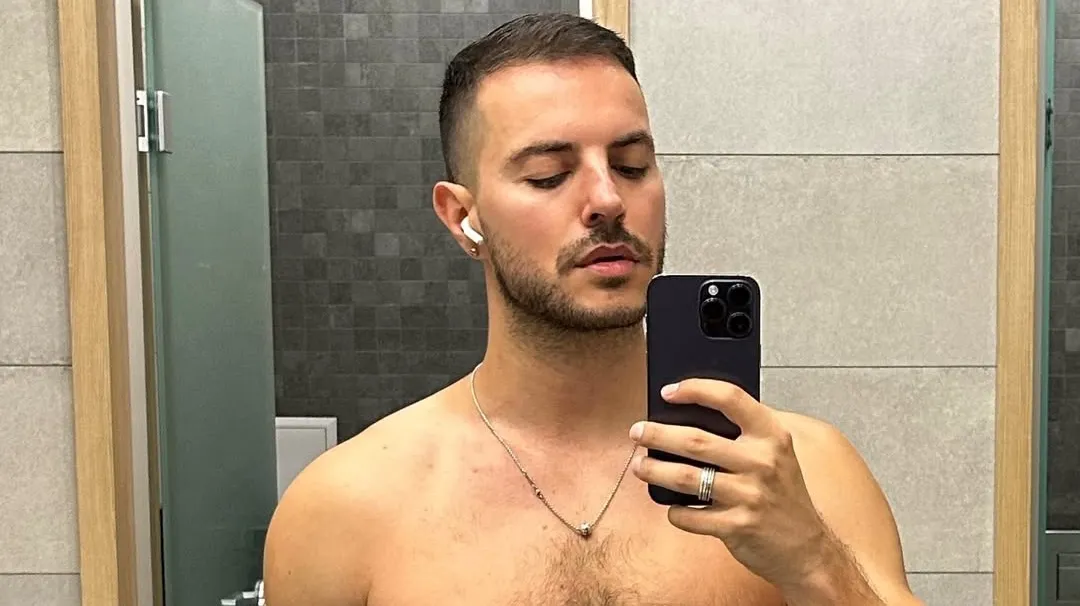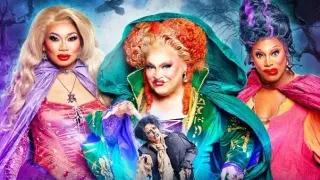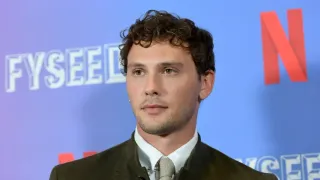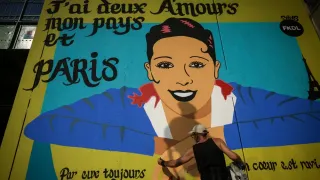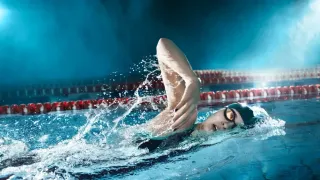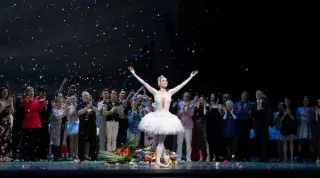October 12, 2021
Review: 'We're Here - Season Two' Continues its Tour of LGBTQ+ Small-Town America
Kilian Melloy READ TIME: 4 MIN.
Bob the Drag Queen, Eureka O'Hara, and Shangela return for "We're Here" Season Two, bringing drag to eight more small towns across America. Along the way they hear heart-wrenching stories, help bolster (or forge) local LGBTQ+ communities, and even perform a drag wedding.
The trio of queens – all of them alums from "RuPaul's Drag Race" – were in the midst of filming the Season Two premiere episode when, in March of 2020, they had to suspend production due to the COVID pandemic. They were in Spartanburg, South Carolina, at the time, working with a young gay man named Noah, a plus-size model of color named Faith, and a straight guy named Olin who, despite his discomfort at the idea of taking part in a drag show, wanted to show his support for his gay older brother, Pat, a drag artist whose stage name is Patty O'Furniture.
Thirteen months later, the three returned. Would their drag daughters still want to work with them? The answer was yes; not only did all three come back to see things through, they'd had a chance for personal evolution in the meantime. Noah came out as non-binary, Faith entered a new relationship with a woman, and Olin grew a beard.
Between times the trio visited Temeculah, California, in December of 2020. Though only an hour away from Los Angeles, Temeculah is, we gather, a red dot in a state many viewers might believe to be solid deep blue. But Temeculah is hardly a liberal bastion: James, a trans teen, talks about being "misgendered left and right," while gay couple Jake and Brad don't feel free to do anything as innocuous as hold hands in public. Jake's mother, Michelle, considers herself to be a "faith influencer," but having a gay son has given her perspective and the ability to understand that gay people don't have to be rejected by people of faith. Michelle has her chance to live her support for Jake by attending the drag show in which Jake and Brad take part.
Andrei, a young Filipino-American in college who ended up back home thanks to the pandemic, doesn't have that same maternal support. Though his father is understanding, his mother "does not approve" of his being gay, much as she didn't approve of his being a cheerleader. But in an illustration of how LGBTQ+ people find the support they need from community and families of choice, all of the drag daughters have a chance to bond.
The remaining three episodes in the five that were made available to critics continue the trend: Family and community are key to the show, and to its participants. In the Texas border town of Del Rio, Esael, the son of Mexican immigrants, finds love and support from his parents; Joey's parents wish to be supportive, but struggle with how to accept their child; and the town itself has elected an openly gay mayor, Bruno, in spite of the previous incumbent's attempt to use photos of Bruno in drag during the election. Bruno, too, is part of the drag show the queens and their small army of helpers put together.
Selma, Alabama – the setting for the fourth episode – is a place charged with historical importance. How could it not? The Edmund Pettus bridge, a notorious landmark named for a Confederate officer and Ku Klux Klan leader, still bears the same name it did when police brutally beat Black Americans who were marching across the bridge in peaceful protest on March 7, 1965. Though the drag daughters in this episode remain a central focus (including Deborah, a grandmother who is fiercely supportive of her gay grandson and her murdered lesbian granddaughter; Joseph, a gay man who survived a "DL relationship" that veered dangerously into an abusive, potentially homicidal situation; and trans woman of color Akeelah), the town itself inevitably becomes a focus. LGBTQ+ residents talk about loving their city even as they feel the dangers it still poses, and a small group of veterans from the 1965 march –�women who were beaten and teargassed – recall their experiences (as, a half century from now, survivors of 2020's racial justice marches will no doubt be telling their own stories; we can only hope more has changed between now and then than between 1965 and last year). It's an emotional moment for all involved, including the viewer, and the words of Akeelah ring out with clarity and truth: "Yes, I'm trans, but that doesn't make me any less of a person."
More highlights follow when, in Episode Five, the queens venture to Evansville, Indiana, a conservative town in a scarlet-red state. Who will show up? "It will either be the Proud Boys or the Pride Boys," Bob the Drag Queen jokes, but there's an uneasy sense that this might be one of the most hostile stopovers of the season... a sense that seems validated when Craig, a local Methodist preacher, has to meet Eureka on neutral territory, thanks to intolerance. Even here, though, brave members of the community make a home and visibly represent a reality at odds with prejudicial assumptions; longtime lesbian couple Barbara and Yvon never felt a need to get married throughout their 38 years together, but as they age they now face the prospect of not having the rights that married couples have in case of a health crisis. They see a drag wedding as the ideal solution. Meantime Kaïs, a young gay Muslim from Tunisia, is still learning what it means to be free to be himself; Indiana is no stronghold of LGBTQ+ friendliness, but back in Tunisia, Kaïs recalls, "kids would turn on me and start literally stoning me" if they found out he was gay.
As in Season One, Eureka, Shangela, and Bob the Drag Queen prove themselves sympathetic, engaged listeners as their drag daughters pour their hearts out, and the show captures deeply affecting moments as people struggling for acceptance and validation step up to grasp the liberation that drag offers them –�and then find out how their communities appreciate them when the applause washes over them at the drag shows that comprise the second half of each episode. Like a grown up road show version of "Glee," "We're Here" offers music, bravado, and people you get come to care about.
"We're Here," Season Two, premieres Oct. 11 at HBO.
Kilian Melloy serves as EDGE Media Network's Associate Arts Editor and Staff Contributor. His professional memberships include the National Lesbian & Gay Journalists Association, the Boston Online Film Critics Association, The Gay and Lesbian Entertainment Critics Association, and the Boston Theater Critics Association's Elliot Norton Awards Committee.
